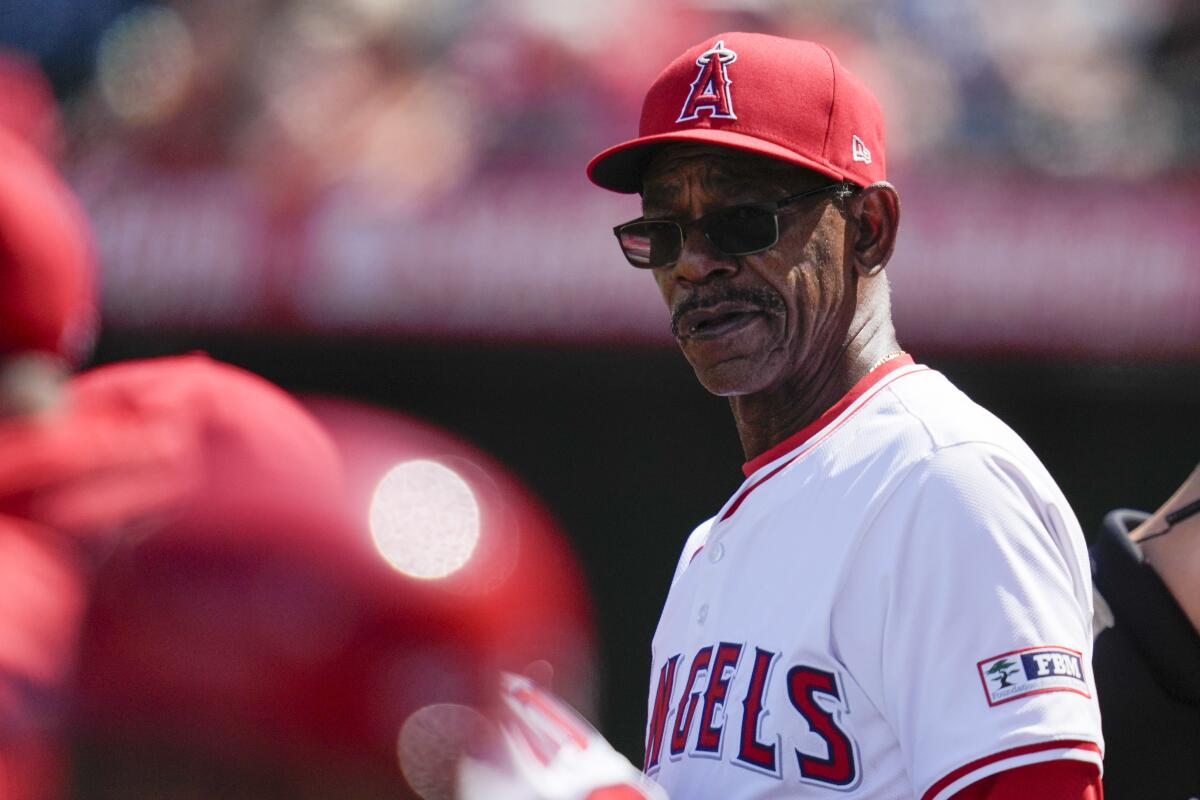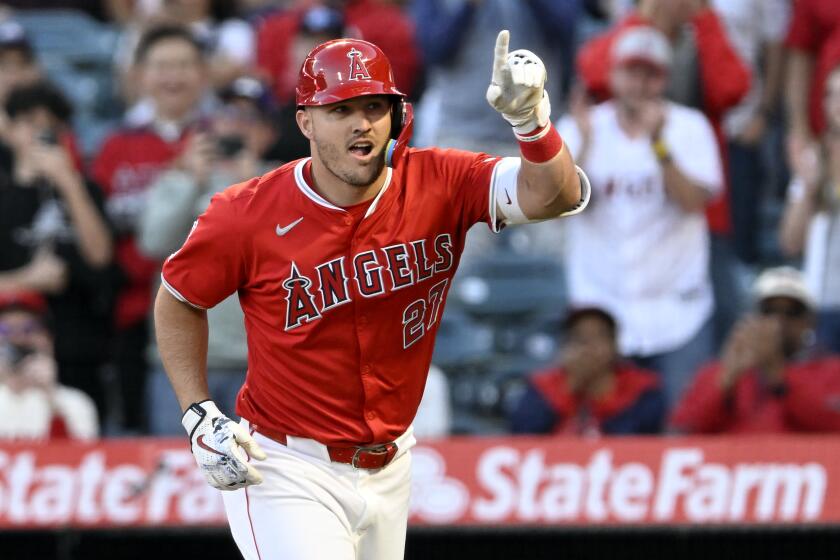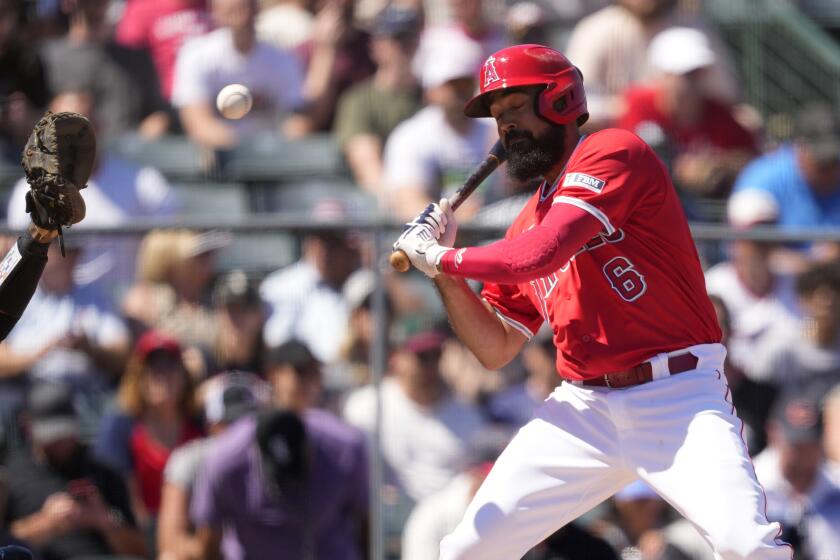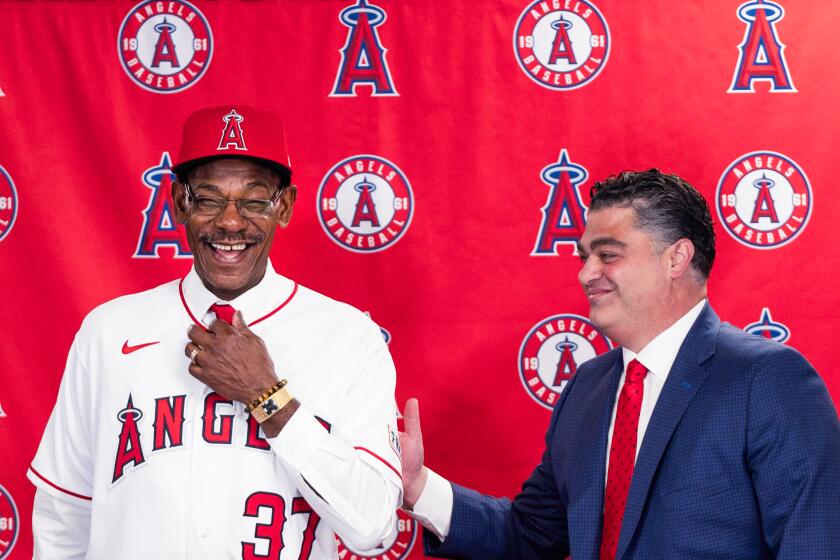Angels struggled with Mike Trout and Anthony Rendon. How much worse can they get?

- Share via
Ron Washington, the first-year manager of the Angels, is unfailingly positive. He was hired in part to inject relentless rah-rah into a franchise that hasn’t reached the playoffs since 2014.
Yet moments after news broke that Mike Trout would need surgery to repair a torn meniscus ... four days after Anthony Rendon revealed he has a “high-grade partial tear” in his left hamstring ... four months after Shohei Ohtani signed with the Dodgers rather than return to the Angels ... Washington’s enthusiasm was muted.
“We’re going to miss Mike,” he said. “I think we all know what he means to this organization. But the thing about baseball — there’s a game on the schedule. You have to play it. You have to put nine guys on the field. So we’re going to put nine guys on the field.”
Washington’s problem is finding nine guys to form a lineup that can hit well enough to consistently win, especially when the staff earned-run average is 28th out of 30 MLB teams at 4.98. All nine of those guys probably aren’t on the Angels roster and the farm system is bereft of prospects remotely ready to become one of those nine.

Never mind star power — that vanished along with Trout, Rendon and Ohtani — the Angels need players who can perform at an acceptable major league level. After a 2-1 loss to the Philadelphia Phillies on Wednesday dropped the Angels record to 11-20, they are in the middle of the pack among MLB teams in runs (17th), batting average (13th) and OPS (15th). Can they sustain that without Trout and Rendon?
“Some guys are going to get the opportunity they’ve been craving, and we’ll see what they can do with it,” Washington said.
Any chance the Angels had of postseason contention this season depended on a healthy Mike Trout and a healthy Anthony Rendon,
Who is he talking about? Outfielders Jo Adell and Mickey Moniak, for starters.
Both are tarnished former high first-round draft picks who haven’t met expectations yet are blessed with an open runway to play nearly every day at age 25.
Adell, the 10th overall pick in the 2017 draft out of Ballard High in Louisville, Ky., conquered every minor league level but repeatedly struggled when promoted to the Angels. In 687 plate appearances in parts of five major league seasons, he’s batted .221 with 22 home runs and 12 stolen bases.
As for memorable moments, he’s authored more bloopers in the outfield and on the basepaths than highlights. His career wins above replacement is -1.4, meaning he hasn’t performed even to the level of a below-average major leaguer.
This year, Adell is off to a solid start, batting .290 with four home runs in 68 plate appearances. The Angels plan to continue penciling him into the lineup to see what he can produce in 500 to 600 at-bats. He’s never had even 400 in a minor or major league season so far.
The Angels haven’t made the postseason since 2014. It’s time for them to finally do something about that.
Moniak, the first overall pick in the 2016 draft by Philadelphia out of La Costa Canyon High in Carlsbad, is off to a horrific start, batting .143 with one home run in 67 plate appearances. His on-base-plus-slugging percentage is a measly .400.
Yet after putting up pedestrian numbers in six seasons in the Phillies farm system, Moniak made great strides upon being acquired along with minor league outfielder Jadiel Sanchez in a trade for right-hander Noah Syndergaard. He hit .280 with 14 home runs in 311 at-bats last season with the Angels after a May promotion from triple-A.
Red flags persisted, however. The left-handed hitting Moniak struck out 113 times while drawing only nine walks. In Trout’s absence, Moniak for now will get the bulk of the time in center field, with veteran Kevin Pillar getting the nod against tough left-handed starters.
Although Washington said of Moniak, “He’s gonna get that extended playing time,” the front office already is rummaging through the bargain bin, calling up outfielder Willie Calhoun — another reclamation project — from triple-A Wednesday.
The same will be true for first baseman Nolan Schanuel, 22, and shortstop Zach Neto, 23. Both are off to slow starts — Schanuel is batting .227 with an anemic .307 slugging percentage, while Neto is batting .238 with a team-high 33 strikeouts — but the front office might figure, why not give them ample opportunity when the team isn’t going anywhere anyway?
Anthony Rendon has a huge paycheck, questionable motivation and paltry production. Angels fans might cheer rather than boo the leadoff hitter who has started 0 for 19.
Most of the Angels’ losses have come with Trout and Rendon in the lineup. Trout has 10 home runs but is batting only .220. Rendon started the season with 21 hitless at-bats but elevated his average to .267 before going on the injured list.
Playing without their two stars is not new for the Angels. Trout, 32, and Rendon, 33, this season will be paid a combined $73.45 million — 43% of the team’s $169.8-million payroll. Yet in the four seasons since Rendon signed a six-year, $245-million contract as a free agent, he and Trout have been on the field together a total of 119 out of 517 games.
At some point, the patience Washington and the Angels front office plan to show with their young players has a limit. Witness the abrupt release this week of veteran outfielder Aaron Hicks, who was batting .140 and was supplanted by Adell as the everyday right fielder.
While it’s true that at age 34 Hicks isn’t a young player, he was cheap given that the Angels were paying him only the $740,000 league minimum. The New York Yankees are on the hook for the remainder of the $19 million owed Hicks this season and next.
“We just thought we needed to start making some changes,” Washington said. “I love Aaron Hicks and appreciate what he did for the time he was here, but the only thing I can say about that is it was time to move on.”
The Angels have a new manager, but the burdensome contracts of Anthony Rendon and Mike Trout are why they still have major problems.
Washington’s perpetual sunny disposition clouded for a moment when asked whether poor performance could lead to additional roster moves.
“We’re not trying to give a message to anyone that if you don’t do this, and if you don’t do that, you won’t be here,” Washington said. “But if they don’t do this, and they don’t do that, then they won’t be here.”
More to Read
Go beyond the scoreboard
Get the latest on L.A.'s teams in the daily Sports Report newsletter.
You may occasionally receive promotional content from the Los Angeles Times.











